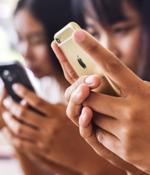Security News

Apple has released new security updates to backport patches released earlier this week to older iPhones and iPads, addressing an actively exploited zero-day bug. Apple addressed the zero-day vulnerability in iOS 15.7.1 and iPadOS 15.7.1 today with improved bounds checking.

In security updates released on Monday, Apple has fixed the ninth zero-day vulnerability used in attacks against iPhones since the start of the year. As Apple explains, if successfully exploited in attacks, this zero-day could have been used by potential attackers to execute arbitrary code with kernel privileges.

We use Apple's Mail app all day, every day for handling work and personal email, including a plentiful supply of very welcome Naked Security comments, questions, article ideas, typo reports, podcast suggestions and much more. We've always found the Mail app to be a very useful workhorse that suits us well: it's not especially fancy; it's not full of features we never use; it's visually simple; and, it's been doggedly reliable.

Apple has pushed out five security fixes including including two vulnerabilities in its iPhones, iPads and Mac operating systems that are already being exploited. The vendor said it fixed the flaw with improved bounds checks and has released patches for iPhone 6 and later, iPad Pro, iPad Air 2 and later, and iPad 5, iPad mini 4, and iPod touch models and all newer kit.

Apple has released security updates to address the eighth zero-day vulnerability used in attacks against iPhones and Macs since the start of the year. In security advisories issued on Monday, Apple revealed they're aware of reports saying this security flaw "May have been actively exploited."

iPhone 14 cheat sheet: Everything to know about Apple's 2022 flagship phones We may be compensated by vendors who appear on this page through methods such as affiliate links or sponsored partnerships. The iPhone 14 and iPhone 14 Plus feature an A15 Bionic chip comprising of a 5-core CPU that's 18% faster for gaming performance than the iPhone 13; a 6-core CPU with 2 high-performance cores and 4 high efficiency cores that produce more performance and increase battery life; and a new image signal processor that works with the new camera system to produce a better image handling pipeline.

Apple on Wednesday backported security updates to older iPhones, iPads, and iPod touch devices to address a critical security flaw that has been actively exploited in the wild. An anonymous researcher has been credited for reporting the vulnerability.

Apple has released new security updates to backport patches released earlier this month to older iPhones and iPads addressing a remotely exploitable WebKit zero-day that allows attackers to execute arbitrary code on unpatched devices. In a security advisory published today, Apple once again said that they're aware of reports that this security issue "May have been actively exploited."

Our much-loved iPhone 6+, now nearly eight years old but in pristine, as-new condition until a recent UDI, hasn't received any security updates from Apple for almost a year. The last update we received was back on 2021-09-23, when we updated to iOS 12.5.5.
![S3 Ep97: Did your iPhone get pwned? How would you know? [Audio + Text]](/static/build/img/news/s3-ep97-did-your-iphone-get-pwned-how-would-you-know-audio-text-small.jpg)
He's so famous that even his ties - he always wears a tie, beautiful coloured ties - even his ties have a Twitter feed, Doug. There are lots of things you can do, provided that: you know where you should be; you know where you want to be; and you've got some way of differentiating the good behaviour from the bad behaviour.